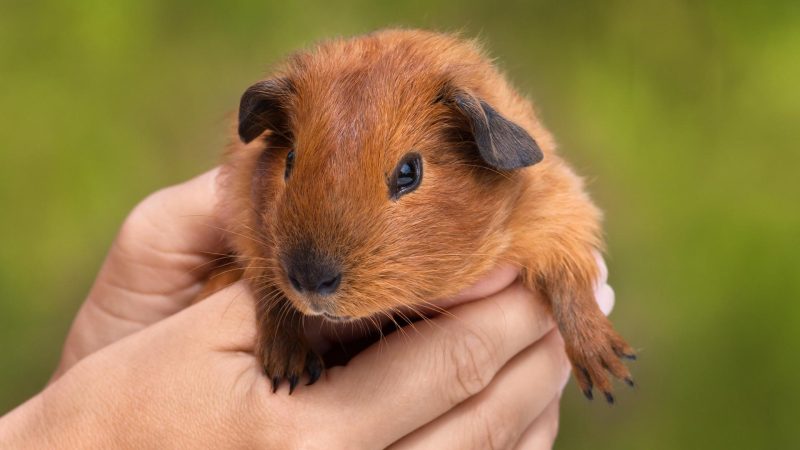One of the best things you can do before getting a pet is to make sure you know everything there is to know about the pet and also what responsibility it involves. Whether your pet is hypoallergenic or not is one of the important subjects that every owner must research.
So, are guinea pigs hypoallergenic? Guinea pigs are not hypoallergenic pets. If you are a more sensitive person, it is normal for you to be concerned about this, but if you generally don’t have any problems with allergies, you have nothing to worry about.
Some people might say some pets don’t cause any allergies, but that would be a lie. Every animal has some allergens even though some may present fewer than others. Continue reading to learn more about it.
Table of Content
Are Guinea Pigs Hypoallergenic?

Guinea pigs are not hypoallergenic. Hypoallergenic is a term that describes if something is less prone to cause allergies. Compared to living with a bigger pet, their living arrangements may help manage allergies more effectively. As a result, they may be a better pet choice for many people with allergy concerns.
All smaller animals and rodents, including cats and dogs, are not regarded completely hypoallergenic. Allergy-causing proteins are present in the hair and other things produced by guinea pigs, chinchillas, hamsters, and rabbits. They are, however, frequently caged so that their shedding, dander, and urine may be limited to a specific area of the house.
General Symptoms When Having Allergic Reactions
Symptoms are probably the same for most people, but they can be more serious in some cases and lighter in others.
The general symptoms are:
- Sneezing
- Coughing
- Wheezing
- Tearing
- Nausea
It is probably impossible to be allergic to something and have no allergic reactions. So, if you’re worried, you can just observe yourself as your body will tell you if something is wrong.
Being allergic to guinea pigs also means coughing, sneezing, and other similar reactions. But don’t worry if you catch yourself sneezing near your guinea pig, this doesn’t mean you are necessarily allergic to them.
Anaphylactic Shock
This is a very serious medical condition. Even if anaphylactic shocks are extremely unlikely to happen, you need to know they exist and they can cause death.
Before anything else, you need to know that an anaphylactic shock is a medical condition caused in most cases by allergens. It involves a hypersensitivity towards some factors and this is really nothing to worry about if you have your allergies under control.
Keep in mind that being allergic to something does not mean that you are going to die because of an anaphylactic shock. The organs or systems frequently affected in an anaphylactic shock are the skin, the cardiovascular system, the digestive system, and the respiratory system. These are the type of organs that you cannot ignore when they are not working as they should be.
When it comes to guinea pigs, chances are low that you are going to get this kind of shock. Still, you have to observe your allergic reactions (if any occur) and consult a doctor whether it needs to be treated or not. If you have allergic reactions, definitely seek help from a professional.
Myth vs. The Truth About the Causes of Allergies
A lot of people worry about pets causing allergies, whether they are guinea pigs or any other kind of pet. Most of them think that the main and certain cause of their symptoms is the pet’s fur or hair. When it comes to guinea pigs, it’s even thought that the longer their hair is, the more they tend to cause allergies.
This is partially true. The furs aren’t a cause for sneezing or coughing, no matter how long it is. But the little particles of dust, urine, and dirt that can be stuck in the pet’s fur are the main cause.
Skin secretions, saliva, and urine are the actual cause of allergies even if a lot of people think that allergic reactions are caused by their hairs. This is why some people might be “allergic” to pets in general. This mix of substances (and honestly, any of them) can and will probably get stuck in their fur causing a build-up.
Some pets might present a more specific cause for allergies. For example, cats’ dead skin cells are different from most pets. It continuously stays in the air, and can easily be breathed in. This is a specific cause for cats while our little guinea pigs are very different.
Why Would These Little Rodents Cause Allergies?

Owners keep their beloved guinea pigs in big cages (“big” being the recommended size). Guinea pigs spend the majority of their time in the cage meaning that they eat in the cage, they urinate in the cage, the hay might be wet. On top of these things, they can also release hormones.
The following are some of the causes of your allergies that you may not be aware of:
1. Urine
When it comes to guinea pigs, the biggest problem is the urine. The bedding in the cage is getting wet from their urine, and afterward, the guinea pig sleeps or stays on the bedding. This way, the bedding comes in direct contact with the guinea pig’s fur, and it sticks to it. This is why you need to pay attention to both their bedding and their fur.
With this in mind, you should be aware by now that it depends on you whether you want to minimize the risk of allergies or not. Also, you need to wash your pet, or at least their dorsal side to prevent both smell and allergies.
2. Hay
Another thing to take into consideration is being allergic to hay. You may think that you are allergic to your guinea pig, but it might be the hay that is causing you trouble. Hay is essential to your little guinea pig, and you cannot have a happy little pig without having hay.
In this case, the solution is very simple. Keep your pet’s hay as far from you as you can. If you live in a house, maybe you can keep the hay outside the house, in a dry space. Try changing the bedding if you use hay as bedding in the cage. Be careful about how you feed your guinea pig with the hay and try to avoid it when it’s not necessary.
Maybe you can be more calculated about the amount of hay you feed them. Another useful tip for you if you are allergic to hay is to use a mask and gloves when cleaning the cage. You can also use an air purifier. All of these tips should help alleviate the symptoms but if they don’t, see a doctor.
Note: Studies show that the amount of allergens pet present is higher in males than in females. This is because some allergens are a direct result of hormones production. After castration, the amount of allergies presented by a male animal has significantly decreased within a month.
How You Can Find Out if You Are Allergic to Guinea Pigs?

First of all, it would be a lot easier for you if you have any kind of relative or friend that has a guinea pig. You can play with the little pet and see if you have any allergic reactions. If you seem to have, you can always see a doctor to give you advice.
If you generally are a sensitive person (maybe you are allergic to particles of dust), that means you are more likely to be allergic to anything, including guinea pigs. The finest thing to do is introduce yourself to a guinea pig slowly the first time. You may be allergic without even assuming you could ever be.
Test yourself carefully as sudden exposure or exposure, in general, can cause anaphylactic shock (in extremely rare cases).
What Should You Do if You’re Allergic to Guinea Pigs?
Although some individuals are allergic to guinea pigs and other pets, this does not exclude you from owning one. Here are some things you can do to decrease allergens in your home:
- It is not advisable to have the guinea pig cage in the bedroom. Make up some space for them. In this way, the allergy will not spread throughout the property.
- In the space where your guinea pigs are maintained, try to have excellent ventilation and airflow.
- Keep hay or other kinds of bedding out of the house in a cool, dry location if you are allergic to it.
- To keep guinea pigs free of allergens, clean the room floor, curtains, or anything else in the area where they are kept. Allow a non-allergic individual to clean the cage to avoid allergy accumulation.
- Before and after handling your guinea pigs, wash your hands. You can use a towel to hold them.
- Keep your guinea pigs away from your mouth and neck. That is your skin’s most sensitive part. If at all possible, keep your guinea pigs away from your beds and other bedding.
- You may also eat a high-vitamin C diet to strengthen your immune system against allergies and cure them in the long run.
Allergy has no defined or effective treatment. For many people who wish to keep a guinea pig despite the allergy, a combination of keeping a clean living environment and medicine appears to be effective.
Summary
There are a lot of aspects to think about when deciding to get a pet. Even if being hypoallergenic is not one of the first that comes to mind, that doesn’t mean that it is less important than others. You need to take into consideration everything you can.
